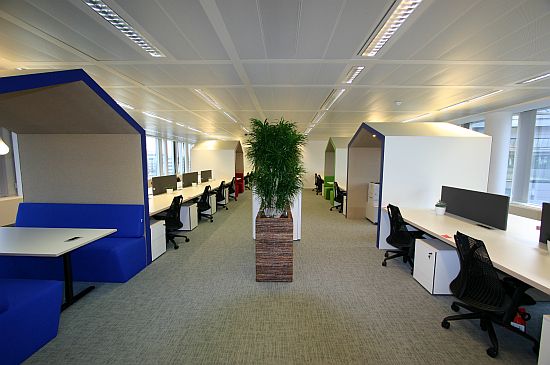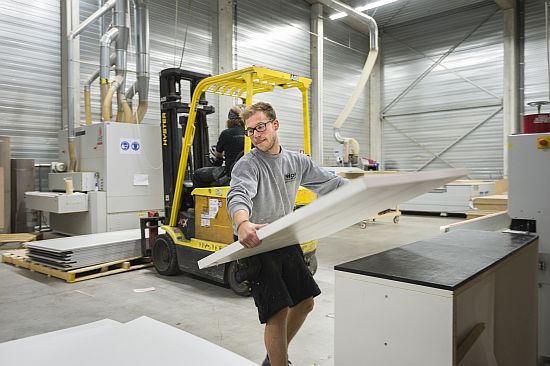Nnof
Nnof transforms old office furniture to create a contemporary workplace
“We give office furniture a second or third life”
Didier Pierre, chairman PMC Holding
|
Designing and producing new office interiors based on existing furniture: that lies at the heart of the activities carried out by Nnof (Nearly New Office Facilities) in Vilvoorde. “Our designs are environmentally friendly, budget-friendly, innovative and flexible.”
Nnof does not consider office furniture due for replacement as waste. It is the raw material with which to design new trendy office furnishings. “We are strong believers in the principle of the circular economy,” explains Didier Pierre, chairman of the parent company PMC Holding. “Rather than dumping existing furniture, we create a new cycle to give it a second or third life.” Repair work The idea behind Nnof came, ten years ago, when PMC Holding – active in removals, logistics and design – calculated its carbon footprint. Didier Pierre: “We followed a French method called Bilan Carbone, which also displays the CO2 emissions that have been avoided. This showed us that our repair work limited our emissions considerably: repairs extend the life of a product and prevent the production of new furniture. Also, for each lorry of new office furniture we installed, we were left with a lorry full of old furniture to get rid of. What a waste. We decided to extend our repair work. And that’s how Nnof saw the light of day.” Raw materials from the economy Nnof’s customers consist of SMEs, multinationals, banks and authorities. “We no longer remove resources from the ground, but take them from the economy. Our principle is: a client has resources, in this case old furniture, and these can be reused. Nnof interior designers set to work and think up a new design, although some customers come up with their own design and ask us to make it work with their existing fittings. We try to keep the circular process with the same client as much as possible. So Nnof does not buy any new furniture to make and launch new products. We do however keep just a small stock of office furniture. This allows us to design workplaces for smaller companies or start-ups.”
Attractive price The benefits of doing things ‘Nnof-style’, as opposed to buying new furniture, are considerable: no new resources are necessary and the production requires far less energy, limiting CO2 emissions. On top of that, by reusing resources, customers avoid creating tonnes of waste. The price is also attractive: On average, Nnof furniture is 20 per cent cheaper than new office furniture. “The attractive price is often the most important argument for our customers,” confirms Didier Pierre. “However, image and respect for the planet are also a factor. For Nnof, there is an additional socioeconomic reason as well: employment. We are constantly looking for motivated employees, including unqualified people.” Growth In the future, Didier Pierre sees the potential to grow above all else. “Nnof is currently only performing at a third of its capacity. If you only knew the quantities of office furniture being bought on a daily basis by public authorities, large banking and insurance offices…. The numbers are enormous. As the only player on the Belgian market in this area, we must be able to take advantage of the opportunity. Time is on Nnof’s side: the circular economy is hot.” |
|
SUSTAINABILITY BENEFIT IN FIGURES ► On average, Nnof furniture is 20 per cent cheaper than new office furniture. ► In 2015, 480,000 kg less waste was produced thanks to doing things ‘Nnof-style’. ► In 2015, CO2 emissions were reduced by 1,200,000 kg thanks to Nnof. |
||||
|
BENEFITS ► Redesign of offices using old furniture and materials →less waste and the promotion of reuse. ► No new products or resources required → fewer CO2 emissions and reduced energy consumption. ► Nnof furniture is cheaper than new furniture. |
||||
Nnof
Sectors Furniture ›


